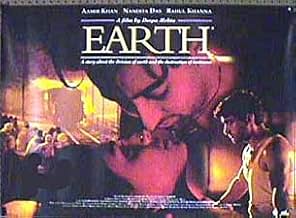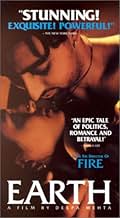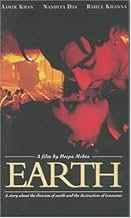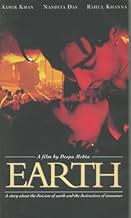Agrega una trama en tu idiomaIt's 1947 and the borderlines between India and Pakistan are being drawn. A young girl witnesses tragedy as her ayah (nanny) is caught between the love of two men and the rising tide of poli... Leer todoIt's 1947 and the borderlines between India and Pakistan are being drawn. A young girl witnesses tragedy as her ayah (nanny) is caught between the love of two men and the rising tide of political and religious violence.It's 1947 and the borderlines between India and Pakistan are being drawn. A young girl witnesses tragedy as her ayah (nanny) is caught between the love of two men and the rising tide of political and religious violence.
- Dirección
- Guionistas
- Elenco
- Premios
- 3 premios ganados y 2 nominaciones en total
- Hariya
- (as Raghuvir Yadav)
- …
- Butcher
- (as Pavan Malhotra)
- Dirección
- Guionistas
- Todo el elenco y el equipo
- Producción, taquilla y más en IMDbPro
Opiniones destacadas
The film, based on the autobiographical novel "Cracking India" by Bapsi Sidhwa, concentrates on the effect the civil turmoil has on personal relationships. Somehow, politics brings out the worst in everyone; submerged resentments and trivial jealousies fuel shocking atrocities. Even innocent little Lenny manages to act badly, despite her "neutral" status.
Despite the presence of at least one "Bollywood" star (Aamir Khan) the director, Deepa Mehta, has not made a crowd-pleaser here. There are survivors, but no surviving heroes. The story unfolds first at a leisurely pace, gaining speed as independence day approaches and ends in a montage of mobs, destruction and violence. Every scene is beautifully composed and almost every part sensitively played. Maia Sethna as Lenny, Nandita Das as her beautiful young nanny Shasta , Rahul Khanna as Hasan, Shastas' lover and Aamir Khan as Dil Navaz the 'ice candy man" are all stand-outs. While not actually filmed in Lahore (the authorities there were not keen, it seems) the film evokes superbly a hot, ancient and troubled land. The whole style of the film is quite different from anything to emerge out of Hollywood and that alone makes it worth seeing.
It is suggested in the film that perhaps the villain here was that old standby, human nature. It does seem, though, that the British India administration (represented here only by one drunken official at a dinner party) and particularly the British government, had a lot to answer for. The twenty-five years or so leading up to independence were marked by the failure of successive conservative British governments to allow a truly responsible democracy to emerge in India when it was quite clear by the end of World War One that independence was inevitable. (The white Dominions on the other hand were practically pushed into independence.) Then, when the post-war Labour government decided to grant independence it did so with unseemly and disastrous haste. No, the chief villain was perfidious Albion, or rather British "muddling through". Here we get a beautiful, moving, elegiac account of the victims of bad colonial policy driven by racism and unenlightened self-interest.
The film has at its heart the year 1947 when India was given its independence from Great Britain and at the same time bifurcated into two countries - India and Pakistan. The story opens with a tranquil park picnic in Lahore where friends - Hindu, Muslim, Sikh, Parsee - while away the afternoon in camaraderie. Only slight overtones of edgy topics about religion mar the conversation until the topic focuses on the incipient split of the country into two countries. Each of the friends represents each of the religious sects and it is how these differences, at once unimportant to friendship, end up in separating the friends under the influence of the devastation of bloodshed that follows the division of the country and the displacement of millions of people, all under the guise of independence.
There is a strong love story, a committed crippled child who experiences all of the happiness and subsequent tragedy that is to follow and the story ends with some words of wisdom by the grown little girl reflecting on choices made, and other sidebars that maintain interest at every frame.
The acting is first rate from a beautiful cast and Mehta's direction makes this tale of change whir by the viewer. For those not educated in the differences of the four religious sects of Hindu, Parsee, Muslim, and Sikh the tale can become confusing: would that Mehta would have included a discussion about the film in an added feature the way she helped us understand the plight of widows in WATER. And the subtitles unfortunately do not translate the English spoken portions of the film, portions that while very important to the story are nearly indecipherable due to the accents of the characters speaking.
But these are minor quibbles in a film that pleads for repeated viewings, so beautiful is the movie and so very important is the message. Highly Recommended.
If the film is conventional is outline, it is also intelligent, beautiful and economical in a way most stodgy historical epics are not. Its predominantly Western structure is filtered through with a restrained Bollywood sensuality, and, in the first half especially, after one has gotten used to the rather stilted dialogue and stylised situations, one is astounded by the caressing fluidity of the camerawork; the uncommon beauty of compositions, especially indoors, where the essentially muted 'earth' colours of the decor are pierced by unearthly shards of light; the profusion of dazzling colours, in costumes, and especially in the horrific marriage sequence, undermining the strained sobriety of most historical epics; the unforced breaks into song and dance, the accumulation of vignettes, some comic, some full of joy and promise, some bursting with foreboding, that give a sense of life being lived, a life already fragile in status, waiting to be destroyed; the unabashed use of melodrama, its critical framing device (in one horrible scene, the protagonists watch helplessly from a balcony the strangely beautiful conflict, passive like us the audience), and its emotional demands on the audience I realise that much of my pleasure comes from a racist 'Orientalism', a projection of my desires of exoticism and Otherness on the East, but my own country has a traumatic history of British Imperialism and partitions, so I don't feel too guilty.
The first half is as good as anything in cinema this year, once one has got used to the shifts in register. It is full of the autumnal sadness of a Chekhov play, or Ray's CHARULATA, or LE REGLE DU JEU, where we observe people living life, being friends, making love playing games, while we know history is sadistically poised on the brink, waiting to crush everything. Mehta never falls into nostalgia for this doomed idyll - she records the legacy of the British Empire; the horrors of the caste system; the emotional repression, the arranged marriages between senile paedophiles and pre-pubescent girls. But this section is also full of epiphany, the thrill of the sexual chase, friendship, poetry and, above all, comedy, all the things about to be distorted and destroyed by history as it performs a body snatching operation onto people we have come to love and turns them into vicious murderers.
The second half is an unrelenting catalogue of jolting spasms of violence. Day gives way to night, earthy browns and sun to blackness, friendship and love to death and hate. The film is also a bildungsroman, the tale of the development of a young girl as she learns about life, love, family, gender, language, society, history, culture, politics a development cruelly cut short, distorted, vandalised - when we see the charming dew-eyed narrator half a century later, emotionally in ruins as she stands self-effacingly in the ruins of Imperial pomp (an amazing shot, the film's sparing use of ruined architecture gives the film on occasion a ghostly feel), we sense irreperable loss.
As an Indian-born American this film had an intense emotional impact on me, as it did with my best friends sitting to my right and left - a Muslim and a Sikh. It seems melodramatic but we sat in our seats, tears in our eyes, stunned.
One of the things I look forward to after every movie going experience is the inevitable discussion that follows. All three of us were silent for almost half an hour. It dawned on us that we could have been the group of friends who were so close at the beginning only to be divided by our demons in the name of religion at the end.
As an aspiring film-maker, I would like to congratulate Deepa Mehta for her courage and determination in presenting such amazing human stories. In an industry where Bollywood sachharine seems to prevail, it is reassuring to see a true artistic voice strike a lyrical chord with the world.
She makes me proud to be Indian first and foremost.
¿Sabías que…?
- TriviaAamir Khan's first negative role. He went on to receive much critical acclaim for his performance.
- Citas
Older Lenny: I was eight years old, living in Lahore in March of 1947, when the British Empire in lndia started to collapse. Along with talks of lndia's independence from Britain came rumblings about its division into two countries, Pakistan and lndia. Hindus, Muslims, and Sikhs who had lived together as one entity for centuries. suddenly started to clamor for pieces of lndia for themselves. The arbitrary line of division the British would draw to carve up lndia in August of 1947 would scar the Subcontinent forever.
- ConexionesFeatured in Women Make Film: A New Road Movie Through Cinema (2018)
Selecciones populares
- How long is Earth?Con tecnología de Alexa
Detalles
Taquilla
- Total en EE. UU. y Canadá
- USD 424,798
- Fin de semana de estreno en EE. UU. y Canadá
- USD 42,449
- 12 sep 1999
- Total a nivel mundial
- USD 424,798
Contribuir a esta página



































